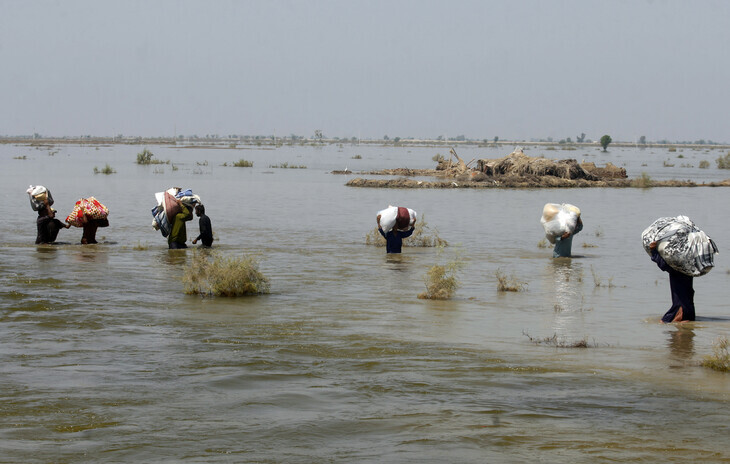hankyoreh
Links to other country sites 다른 나라 사이트 링크
UN raises alarm on climate: “We are heading in the wrong direction”

The World Meteorological Organization (WMO) and other international agencies that deal with climate issues said on Tuesday that the world is “heading in the wrong direction” in a joint report that explores how global warming and climate disasters are gradually growing more severe.
In a report on climate change drafted with six organizations, including the UN Environment Programme and the World Climate Research Programme, the WMO noted that global warming mitigation pledges are out of step with reality as greenhouse gas concentrations in the atmosphere reach record highs.
“WMO reports that the number of weather-related disasters has increased by a factor of five over the past 50 years, claiming, on average, the lives of 115 people and causing US$202 million in losses daily,” the report said.
“Heatwaves in Europe. Colossal floods in Pakistan. Prolonged and severe droughts in China, the Horn of Africa and the United States. There is nothing natural about the new scale of these disasters. They are the price of humanity’s fossil fuel addiction,” said UN Secretary-General António Guterres.
The report found that atmospheric concentrations of greenhouse gases such as carbon dioxide, methane and nitrous oxide dropped briefly because of COVID-19 in 2020 but are now rising again.
Observatories in Hawaii (US) and Tasmania (Australia) reported carbon dioxide levels of 420.99 parts per million (ppm) and 413.37 ppm, respectively, in May of this year, in a marked increase from 2021.
The report offered a 93% chance that average temperatures will exceed the records set in 2016 over the next five years (through 2026) and predicted that average temperatures during that period will be higher than in 2017-2021.
Surface temperatures over the next five years are predicted to be 1.1-1.7 degrees Celsius higher than the average between 1850-1900, in the pre-industrial period. The report said there’s a 48% chance that temperatures will be 1.5 degrees higher than in pre-industrial times in at least one of those years.
The goal of the climate agreement reached in Paris in 2015 is to keep global temperatures from rising more than 1.5 degrees above pre-industrial levels. Toward that end, major countries from around the world upped their carbon reduction pledges or announced new pledges during the 26th UN Climate Change Conference, known as COP26, in Glasgow in November 2021.
But current reduction plans aren’t enough to achieve the goal of curbing global warming, the report asserted. Even if all the current mitigation pledges are implemented by 2030, average temperatures this century are expected to rise around 2.5 degrees (2.1-3.0 degrees) from pre-industrial levels.
“The ambition of these new pledges would need to be four times higher to get on track to limit warming to 2 degrees and seven times higher to get on track to 1.5 degrees,” the report said.
Urban areas — which house 4.2 billion people, or 55% of the earth’s population — are not only responsible for more than 70% of greenhouse gas emissions but will also face the brunt of the damage from climate change.
“Globally, by the 2050s, over 1.6 billion people living in over 970 cities will be regularly exposed to 3-month average temperatures reaching at least 35 degrees C (95 F),” the report warned.
“Climate science is increasingly able to show that many of the extreme weather events that we are experiencing have become more likely and more intense,” said WMO Secretary-General Petteri Taalas. “It is more important than ever that we scale up action on early warning systems to build resilience to current and future climate risks.”
By Shin Gi-sub, staff reporter
Please direct questions or comments to [english@hani.co.kr]

Editorial・opinion
![[Column] The state is back — but is it in business? [Column] The state is back — but is it in business?](https://flexible.img.hani.co.kr/flexible/normal/500/300/imgdb/original/2024/0506/8217149564092725.jpg) [Column] The state is back — but is it in business?
[Column] The state is back — but is it in business?![[Column] Life on our Trisolaris [Column] Life on our Trisolaris](https://flexible.img.hani.co.kr/flexible/normal/500/300/imgdb/original/2024/0505/4817148682278544.jpg) [Column] Life on our Trisolaris
[Column] Life on our Trisolaris- [Editorial] Penalties for airing allegations against Korea’s first lady endanger free press
- [Editorial] Yoon must halt procurement of SM-3 interceptor missiles
- [Guest essay] Maybe Korea’s rapid population decline is an opportunity, not a crisis
- [Column] Can Yoon steer diplomacy with Russia, China back on track?
- [Column] Season 2 of special prosecutor probe may be coming to Korea soon
- [Column] Park Geun-hye déjà vu in Yoon Suk-yeol
- [Editorial] New weight of N. Korea’s nuclear threats makes dialogue all the more urgent
- [Guest essay] The real reason Korea’s new right wants to dub Rhee a founding father
Most viewed articles
- 1Amid US-China clash, Korea must remember its failures in the 19th century, advises scholar
- 260% of young Koreans see no need to have kids after marriage
- 3[Column] Life on our Trisolaris
- 4[Column] The state is back — but is it in business?
- 5New sex-ed guidelines forbid teaching about homosexuality
- 6How daycares became the most viable business for the self-employed
- 7Presidential office warns of veto in response to opposition passing special counsel probe act
- 8[Reporter’s notebook] In Min’s world, she’s the artist — and NewJeans is her art
- 9Trump asks why US would defend Korea, hints at hiking Seoul’s defense cost burden
- 10OECD upgrades Korea’s growth forecast from 2.2% to 2.6%